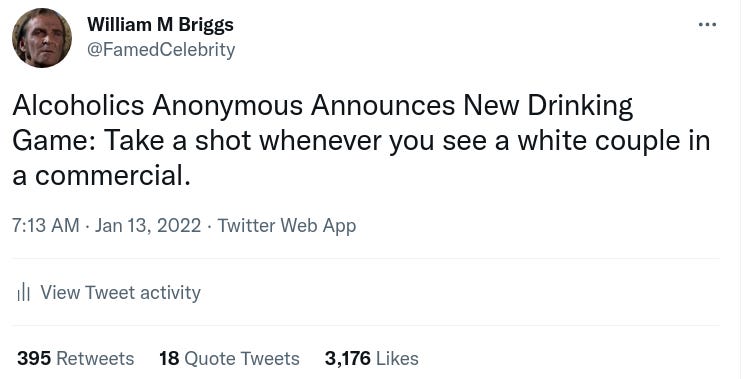Twitter Likes & Impact Factors Are Equivalent
This is one of my favorite tweets (regular readers have seen it before; it's screenshotted because all my tweets die tragically of coronadoom---it used to be cancer---after 7 days):
Here is another tweet by a popular figure:

The first difference you will have noticed is that the first tweet is funny, and that the second is hilarious.
There are other key differences. The bottom right of the first tweet indicates that 3,176 people "liked" the tweet when it was screenshotted. And I can report to you that it did not rise much about that when, alas, the tweet finally died. At the time of writing (Thursday morning), the second tweet had 20.8K "likes", a number sure to grow by the time you see this article.
Now simple math shows that 20.8K divided by 3,176 is about 6.5; and by the time you see this, the ratio will likely be above 7. To fix ideas, let's use that number.
The scientific conclusion is that Biden's tweet is 7 times funnier than mine.
If you smiled at mine, you must have guffawed to Biden's. If you chuckled aloud at mine, you must have nearly choked with laughter at Biden's.
Science says so. Because voting proves scientific validity.
This isn't me, Briggs, Briggs The Cancelled One, Briggs the notorious Thought Criminal, telling you. This is science telling you. And I can prove it.
What do you say when a sack of cow shit dropped from a great height hits the floor? You say it makes an impact.
Presumably, the larger the sack, or the more that is stuffed into it, the greater the impact. And the larger area of spread and spray. If we measured---or, to say this more scientifically, if we quantified---the amount of cow shit in the bag, we'd discover an increasing numerical relationship: the more shit, the greater the impact.
We could call this scientific quantification the impact factor.
Some of you will have pegged my second hilarious joke, which if it were subjected to a tweet would surely prove to be more than 10 times funnier than Biden's.
For those who haven't uncovered the humor, I am pleased to announce that scientists already have an impact factor. It functions exactly the same way as likes on Tweets.
According to Wokeipedia:
The impact factor...[is] the yearly mean number of citations of articles published in the last two years in a given journal, as indexed by Clarivate's Web of Science. As a journal-level metric, it is frequently used as a proxy for the relative importance of a journal within its field; journals with higher impact factor values are given status of being more important, or carry more prestige in their respective fields, than those with lower values.
Each citation is a "like", and the greater the likes a journal gets, the most prestigious that journal is. Scientifically speaking. The only difference between Twitter likes and impact factors is that citation/likes are limited to scientists.
Also like Twitter, he who has shall be given more. The more likes you get, the more prestige and followers, and the more likes you receive in the future. The higher your impact factor, the more prestige and readers and submissions, and the more citations you receive in time.
Scientists being scientists, there are rival measures to the impact factor, "altmetrics" such as the H-index and G-index and so on. They are all the same at heart, however, differing only in mathematical detail.
So now, at long last, the question you knew was coming: do the number of likes indicate truth or quality?
Obviously not, that would be the Voting Fallacy. Though the two can be correlated. The correlation, however, is weak, both on Twitter and in journals. And it can be time dependent: in times of sanity, the correlation is positive; in times of great madness (ours), the correlation is negative.
For the indexes (likes and citations) are only measures of popularity. Knowing only their value tells you nothing. The numbers themselves produce vast, vast over-certainty, as if one number can capture all dimensions of humor or scientific worth. And knowing only the number, and not the times, tells you nothing at all.
Buy my new book and learn to argue against the regime: Everything You Believe Is Wrong.
Visit wmbriggs.com.




